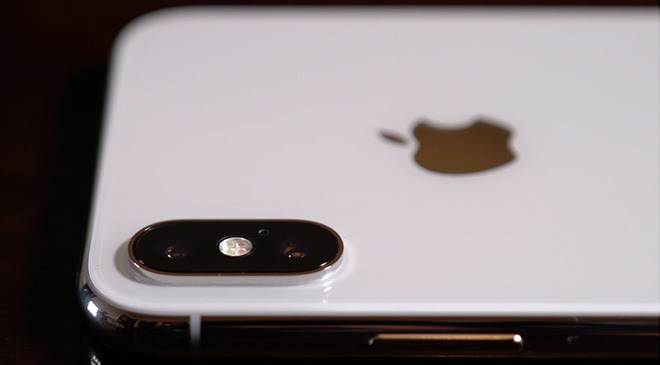Though the wider smartphone market contracted in the first quarter of 2018, Apple was able to grow its share of the pie on the back of healthy iPhone demand in the U.S. and China, according to market analytics firms.
As usual, IDC, Strategy Analytics and Kantar released their respective smartphone estimates for quarter one on Wednesday, each of which showed Apple gain ground on industry rival Samsung. Notably, the three firms recognized a troubling dip in worldwide smartphone shipments, one that Apple defied thanks to an above-average performance.
Apple reported its best March quarter ever on Tuesday, with $61.1 billion in revenue driven by iPhone sales reaching 52.2 million units. Thanks to a good mix of high-end models, specifically iPhone X, iPhone ASPs held above the $700 mark at $728.30.
According to IDC, Apple's sales were good enough for 15.6 percent of the worldwide market, up from 14.7 percent in the year-ago period. Samsung retained its spot at the top with 78.2 million units shipped to grow its share of the market by 0.1 percent to 23.4 percent. However, overall shipments were down nearly two million units for the Korean tech giant, with IDC seeing a year-over-year drop of 2.4 percent.
Huawei came in third behind Apple with 39.3 million units shipped to capture 11.8 percent of the market, up 13.8 percent year-over-year. Fourth-place Xiaomi saw massive gains of 87.8 percent on shipments of 28 million units, enough grow its marketshare to 8.4 percent. Oppo landed in fifth with 23.9 million units shipped and 7.1 percent of the market, down 7.5 percent from the same time last year.
IDC estimates the worldwide smartphone market declined 2.9 percent year-over-year. China was largely to blame for the poor performance, the firm said, as shipments there dipped below 100 million for the first time since 2013.
Unsurprisingly, it was in China that Apple experienced healthy growth. During an earnings conference call on Tuesday, CEO Tim Cook said iPhone X was the top-selling smartphone in China over the three-month period ending in March. Kantar estimates iPhone captured 22.1 percent of that market, adding iPhone 8 posted "marginally higher numbers" than iPhone X in the U.S. and top-five European markets.
Strategy Analytics posted estimates similar to those turned in by IDC, though market percentages are slightly askew. Samsung's 78.2 million units shipped translates to a 22.6 percent marketshare under Strategy's model, while Apple and Huawei's figures equate to shares of 15.1 percent and 11.4 percent, respectively.
The firm's estimates for Xiaomi and Oppo are more liberal than those from IDC, claiming a respective 28.3 million and 24.1 million units shipped. Xiaomi's performance earned it 8.2 percent of the market compared to Oppo's 7 percent.
Strategy Analytics estimates the worldwide smartphone market declined 2.4 percent in the March quarter.
 Mikey Campbell
Mikey Campbell







-m.jpg)






 Charles Martin
Charles Martin
 Christine McKee
Christine McKee
 Wesley Hilliard
Wesley Hilliard
 Malcolm Owen
Malcolm Owen
 Andrew Orr
Andrew Orr
 William Gallagher
William Gallagher
 Sponsored Content
Sponsored Content







7 Comments
You would think analysts would stop using supply chain checks to predict iPhone sales, but they're very stubborn. I'm sure they're going to use the same methods in the next quarter a couple of weeks before Apple's earnings report to show that the iPhone is again losing market share in order to frighten the gutless Apple shareholders into dumping their shares. Analysts will use any method they can to spread doom and gloom for Apple. What's amazing is how these analysts can get away with this nonsense every financial quarter. Apple had a solid quarter. Nothing spectacular. It's to be expected that Apple isn't able to grow revenue in double digits. However, Apple certainly beat its own guidance and that isn't terrible. Wall Street's expectations of Apple always seem to be quite high despite a smartphone market glut. I just hope Apple updates its desktops and laptops to increase revenue next quarter. That shouldn't be too much to ask of a company sitting on a mountain of repatriated cash.
Not all “smartphones” are being used as “smartphones”. Myself and others have said that cheap Android handsets are being used as glorified “smartphones”. That means their useful lifecycle is elongated compared to those being used as true “smartphones” (much greater data usage) do.
If if the above is true (I think it is) then the decline in worldwide “smartphone” unit sales can be attributed primarily to those units used as glorified feature phones - aka cheap Androids.
That iPhone is gaining market share would seem to support this thesis.
Apple doesn't care about market share. they could gain huge market share by lowering prices. But they don't. That would reduce their profits. Total profits is what Apple cares about.
Anything and everything else is secondary.
If you prefer to read values in tables then here you are but some gains are unsure as it is not clear they are in units or market share. There is missing number of data to fill table.completely